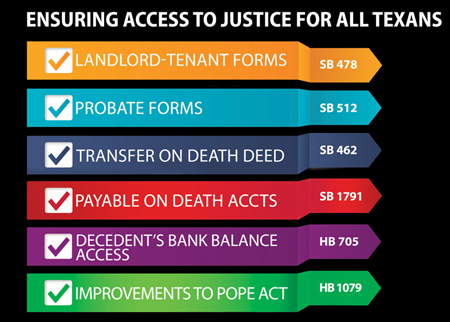UPDATE | By Harry M. Reasoner, Chair
 The Texas Access to Justice Commission and other access to justice institutions, under the leadership of the Supreme Court, worked hard during the past legislative session on both funding and non-funding efforts with great success. Access to justice will be improved because of the actions of the Legislature.
The Texas Access to Justice Commission and other access to justice institutions, under the leadership of the Supreme Court, worked hard during the past legislative session on both funding and non-funding efforts with great success. Access to justice will be improved because of the actions of the Legislature.
The Legislature passed several measures greatly improving funding for legal aid, which are discussed in more detail in Harriet Miers’ and Dick Tate’s article.
They also passed five bills that will help many thousands of low-income Texans who cannot afford an attorney address their legal needs. Three bills provide alternatives to probate or improvements to the probate process, and the remainder relate to forms.
Alternatives to Probate
A home or a bank account may be the only assets a low-income person has. Yet, for the state’s poorest residents, the financial difficulty of obtaining a will or probating that will can be overwhelming.
Offering simple and feasible alternatives to probate proceedings can be of inestimable value.
Senate Bill 462, by Senator Joan Huffman, creates a transfer on death deed, which is a new way for Texans to pass real property outside of probate. For less than $50, low-income Texans can now pass clear title to their family homes without the expense of trying to obtain legal assistance or paying probate costs.
Senate Bill 1791, by Senator Rodney Ellis, improves the disclosures that banks make to their customers about payable on death accounts. The goal is to encourage consumers to choose payable on death accounts so their account assets can pass directly to their named beneficiary without the burden and cost of probate.
Paying $1,000 to gain access to a bank account with $500 is an impossible situation, but now that unjust trap can be avoided.
Representative Jessica Farrar sponsored the House versions of both bills, and her tireless work to gain support was critical to the passage of these bills.
Simplification of the Probate Process
When an estate is worth $50,000 or less and no will exists, heirs can probate the estate by filing a simpler and much less costly small estate affidavit. The only limitation is that they need to show that the estate has no debt, which can be impossible when you don’t have access to any of the decedent’s account information.
House Bill 705, by Representative Farrar, allows an heir to obtain a court order directing a bank to disclose a decedent’s bank account balance, which makes it possible to determine if there are enough assets to cover the debts of the estate.
Senator Ellis carried the senate version of the bill and ensured that it sailed through smoothly, without controversy.
Court-Approved Forms for Self-Represented Litigants
The passage of Senate Bill 512 by Senator Judith Zaffirini authorized the creation of forms to allow low-income Texans who cannot afford a lawyer to address their probate needs, including simple will forms, small estate affidavit forms, and muniment of title forms.
Senate Bill 478, also by Senator Zaffirini, authorized the creation of forms to resole housing disputes in landlord-tenant matters. For Texans on the edge of homelessness, these forms can make all of the difference.
Senator Senfronia Thompson authored the House companions to these bills and guided them through to successful passage.
The creation and implementation of these forms will take time, but when they are finished, Texas residents will have another path to justice.
Generations preserved
These efforts weren’t just about helping one Texan, but generations of Texans whose struggles are far from hypothetical. They’re average people who deserve to keep what they’ve earned.
We are grateful that our Texas legislators have created additional paths to access to justice.
It could be a year or more before the probate forms and landlord-tenant forms become available, but the other three bills go into effect on September 1.
These are achievements to celebrate, but we must continue to seek ways to provide access to justice that do not require additional funding. We have no prospect in the near term of funding representation for the four out of five qualified people who seek legal representation and are turned away.
 Harry M. Reasoner is the chair of the Texas Access to Justice Commission and a partner at Vinson & Elkins in Houston, Texas. His principal area of practice is complex civil litigation, including antitrust and securities litigation. He is a Fellow of the American College of Trial Lawyers, the International Academy of Trial Lawyers, the International Society of Barristers, and the American Bar Foundation.
Harry M. Reasoner is the chair of the Texas Access to Justice Commission and a partner at Vinson & Elkins in Houston, Texas. His principal area of practice is complex civil litigation, including antitrust and securities litigation. He is a Fellow of the American College of Trial Lawyers, the International Academy of Trial Lawyers, the International Society of Barristers, and the American Bar Foundation.



